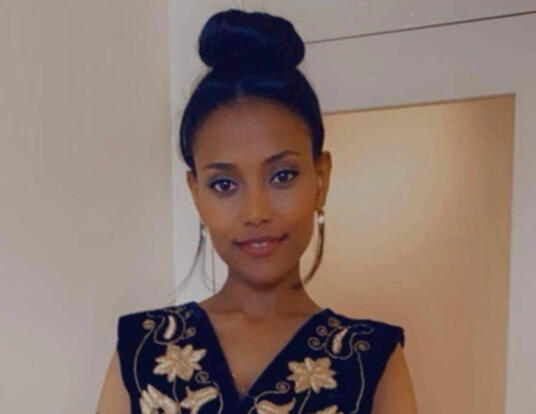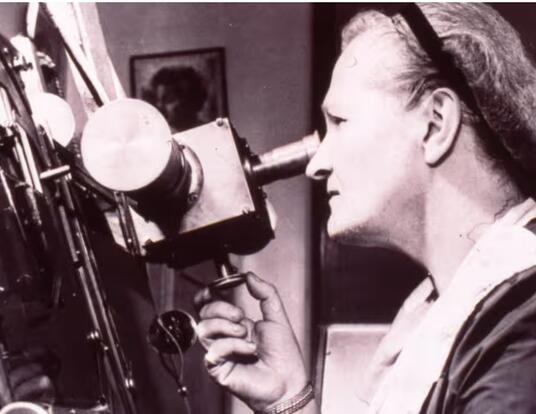A World Remade by Violence
How Nigerians rebuild their lives in the face of terrorism
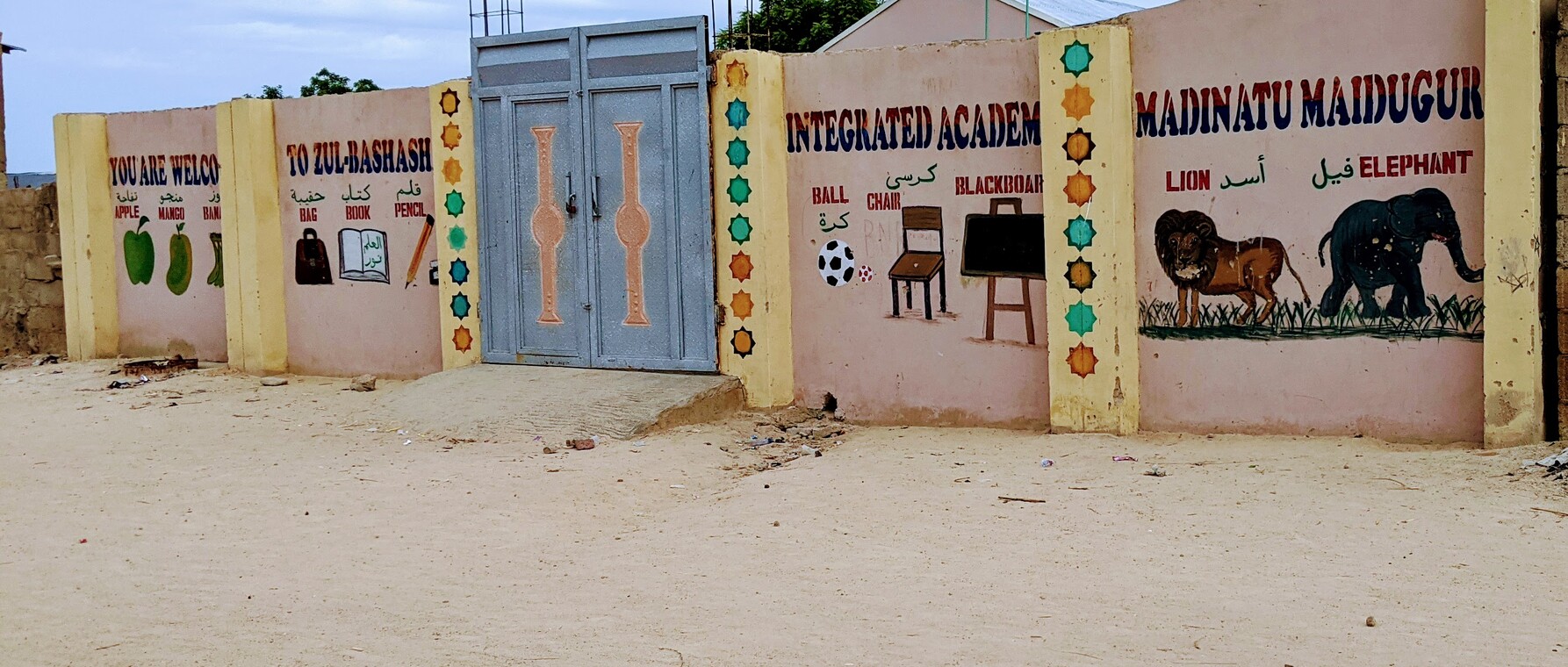
Research at Risk: Since World War II, universities have worked with the federal government to create an innovation ecosystem that has yielded life-changing progress. Now much of that work may be halted as funding is withdrawn. Find out more about the threats to medical, engineering, and scientific research, as well as how Harvard is fighting to preserve this work—and the University's core values.

In 2014, Boko Haram terrorists kidnapped 276 female students from their dormitory at the Government Girls Secondary School in the Nigerian town of Chibok. The act inspired international outrage and a worldwide campaign to #BringBackOurGirls. Far less attention has been paid, however, to the plight of those who escape Boko Haram’s violence and become displaced within their own country.
“Scholarship on internal displacement does not receive wide coverage,” says PhD candidate and 2023 Harvard Horizons Scholar Gbemisola Abiola. “But those displaced by Boko Haram’s violence are creating deep psychological, social, and cultural shifts in Nigeria, the most populous country and largest economy in Africa.”
Abiola’s Harvard Horizons project, “In the Wake of Boko Haram's Terror: A Study of Internal Displacement in Northeast Nigeria,” is a comparative ethnographic study of different sites—camps, informal settlements, and host communities—where internally displaced persons (IDP) resettle. Through research conducted in the country’s Borno state between 2018 and 2021, she hopes to advance understanding of protracted displacement, the new structures of social and economic life that emerge from it, and the different survival strategies and tools IDP use to rebuild their lives.
Survival Strategies
One of Abiola’s doctoral advisors, Alfred North Whitehead Professor of African and African American Studies and of Anthropology Jean Comaroff, says that her advisee’s research aims to study the world remade by Boko Haram’s violence.
“There is a whole universe of social existence formed by those displaced by Boko Haram, those who have escaped from its ravages, but have lost kin, property, and the means to sustain a livelihood,” Comaroff says. “These people must take refuge with relatives or reside in displaced people’s camps and settlements—and also sometimes in urban neighborhoods—where their survival is dependent on donations from aid agencies and the government, and the assistance of relatives and neighbors.”
Internally displaced persons go from host communities, where resources are scarce, to camps, where they may or may not receive aid on time—or at all. With their hopes dashed, they sometimes return to host communities or settlements, where they’ve lost access to their previous homes.
–Gbemisola Abiola
According to Abiola, these camps are mostly overseen by non-governmental organizations in collaboration with state emergency management agencies. In her research, she maps and compares the ways that violent displacement has shaped the experiences of the people living in different sites while looking at how local and transnational aid act as mediating influences. Her findings suggest that a continuum of displacement exists.
“People start in northeast Nigeria, spill into other West African countries, and loop back to Nigeria again,” she explains. “They move from being displaced to being refugees to becoming returnees as the government closes down the camps, only to once again become displaced. A continuum of movement also exists within Nigeria between different sites, as IDP go from host communities, where resources are scarce, to camps, where they may or may not receive aid on time—or at all. With their hopes dashed, IDP sometimes return to host communities or settlements, where they’ve lost access to their previous homes.”
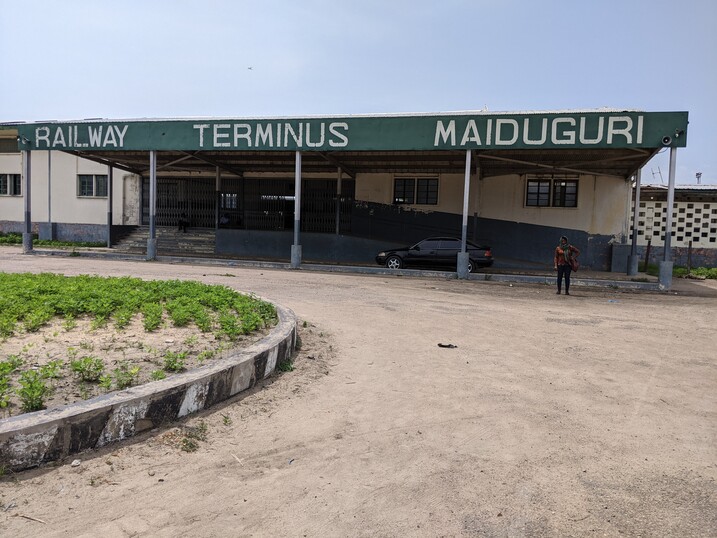
Protracted displacement often forces people to become creative and resilient. It also can inspire what Abiola calls “networks of solidarity”: communities of support that map onto religious affiliations, ethnic similarities, and, sometimes, political associations. She points to the Tariqa community settlement and the Christian Association of Nigeria IDP camp as examples.
“These religious groups provided shelter and living spaces that enabled their members and non-members alike to feel a sense of stability and safety amid the precarity that had defined their lives,” she says. “They not only provided material support but also spiritual and psychological support for their members who had experienced deep psychological traumas.”
Although IDP move within national borders, they often end up in unfamiliar places where they encounter different cultures. Borno state, for instance, has 17 Local Government Areas (LGAs) that are home to around 30 ethnic groups. Some individual LGAs have four or more. Displacement forces some IDP into an urban setting where they interact with different ethnic groups for the first time—an experience that can be jarring. But Abiola says that cultural differences usually do not prevent host communities from providing support to new IDP.
“The fact that people come from the same location, or the same region does not necessarily mean they share the same culture,” she says. “Nevertheless, when it comes to a situation where a person is in need, communities kind of shove aside cultural differences and offer to help.”
Ingenious and Creative Efforts
Amid this hardship, Abiola says that she’s observed the emergence of new forms of social and economic life. “With lots of aid dollars pouring in and many expatriates—mostly humanitarian aid workers, living in and working from Maiduguri, Borno’s capital city—new businesses that never existed or did only on a small scale began to proliferate and thrive,” she says. “These include grocery stores and supermarkets that catered largely to the needs of expats and neighborhood produce supply stores contracted by aid organizations to provide produce to registered IDPs.”
The recipients of these supplies are mostly women, who also gain financial independence, participating in the banking system for the first time through the stipends they receive from aid organizations. “Inevitably, this impacts gender norms and practices as newfound financial freedom enables women to assert themselves in a patriarchal-ordered society,” Abiola says. “New gig economies emerge, too, from expat catering services to paid and unpaid humanitarian work. This especially gives young people the opportunity for economic and financial independence in ways that had been unattainable.”
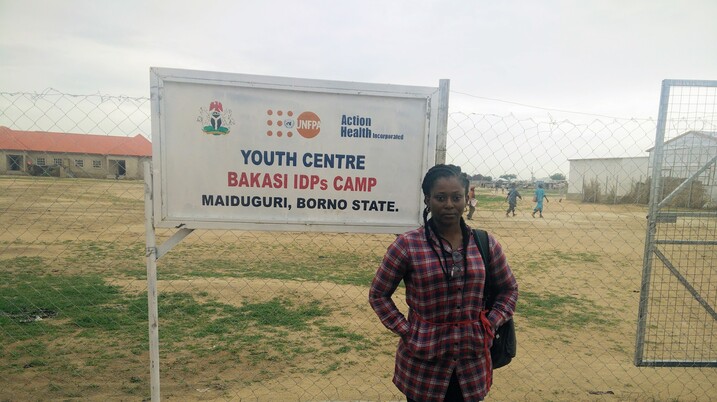
Comaroff says that Abiola’s observations in the camps and settlements in northeastern Nigeria reveal a diverse array of modes of life where trauma, fear, and dependency are never really absent.
“Her fieldwork has revealed many visible signs of ingenious and creative efforts to endure and build life anew by dint of sheer necessity,” she explains. “There is a kind of political canniness that emerges from such conditions. Gbemisola resists the representation of these people as reduced, en masse, to a state of ‘bare life.’ She shows that displacement can be savagely productive and moves beyond the trauma that often hides the myriad practical ways in which refugees seek to move on.”
Daniel Agbiboa, an assistant professor of African & African American studies and another of Abiola’s faculty advisors, says that the Horizons Scholar’s research is distinctive because of the time she has spent on the ground in Nigeria—sometimes putting her own safety at risk.
[Abiola’s] fieldwork has revealed many visible signs of ingenious and creative efforts to endure and build life anew by dint of sheer necessity.
–Professor Jean Comaroff
“Gbemisola has courageously walked in the shoes of IDPs caught in the crossfire between Boko Haram’s banal terrorism and military repression, and her affectively charged account takes their voice, lived experience, coping strategies, and desires seriously,” he says. “She brings a realness to the study of IDPs that invites us to feel with the margins of violence and recognized the agency of precarious existence.”
Apart from broadening anthropological insights on the impact of internal displacement, Abiola’s contributions also advance studies on post-conflict reconstruction and the field of security policy. Her work shows that there is no single displacement story.
“By studying the diverse experiences of IDP, I hope to give scholars and policymakers a deeper understanding of an often-overlooked aspect of national unrest,” she says. “Showing how multiple actors interface with IDP—who all have different interests—in a society of heterogeneous displacement, amplifies our comprehension of the complexity of social suffering, the impact of psycho-social rupture, and how the effects of multidimensional stress may create other avenues for conflict. Importantly, we also can learn how people make lives in the wake of violent displacement.”
Photos by Stu Rosner and Courtesy Gbemisola Abiola
The 2023 Harvard Horizons Symposium will take place on Tuesday, April 11, 2023 at 5:00 p.m. in Sanders Theatre.
Get the Latest Updates
Join Our Newsletter
Subscribe to Colloquy Podcast
Simplecast



